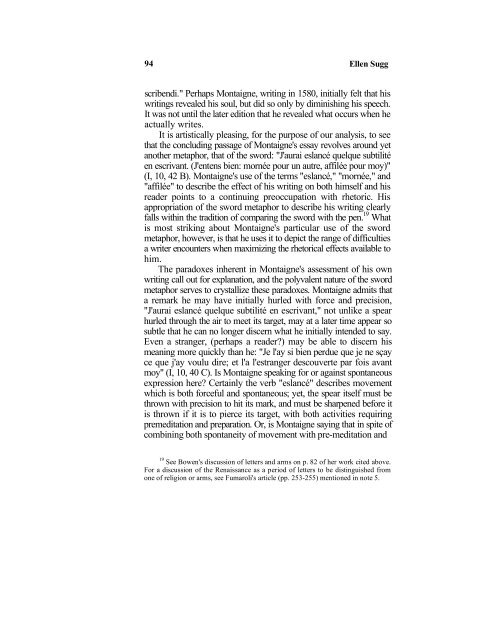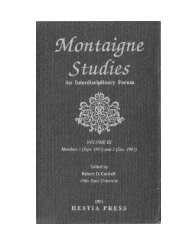Free PDF Download - Montaigne Studies - University of Chicago
Free PDF Download - Montaigne Studies - University of Chicago
Free PDF Download - Montaigne Studies - University of Chicago
You also want an ePaper? Increase the reach of your titles
YUMPU automatically turns print PDFs into web optimized ePapers that Google loves.
94 Ellen Sugg<br />
scribendi." Perhaps <strong>Montaigne</strong>, writing in 1580, initially felt that his<br />
writings revealed his soul, but did so only by diminishing his speech.<br />
It was not until the later edition that he revealed what occurs when he<br />
actually writes.<br />
It is artistically pleasing, for the purpose <strong>of</strong> our analysis, to see<br />
that the concluding passage <strong>of</strong> <strong>Montaigne</strong>'s essay revolves around yet<br />
another metaphor, that <strong>of</strong> the sword: "J'aurai eslancé quelque subtilité<br />
en escrivant. (J'entens bien: mornée pour un autre, affilée pour moy)"<br />
(I, 10, 42 B). <strong>Montaigne</strong>'s use <strong>of</strong> the terms "eslancé," "mornée," and<br />
"affilée" to describe the effect <strong>of</strong> his writing on both himself and his<br />
reader points to a continuing preoccupation with rhetoric. His<br />
appropriation <strong>of</strong> the sword metaphor to describe his writing clearly<br />
falls within the tradition <strong>of</strong> comparing the sword with the pen. 19 What<br />
is most striking about <strong>Montaigne</strong>'s particular use <strong>of</strong> the sword<br />
metaphor, however, is that he uses it to depict the range <strong>of</strong> difficulties<br />
a writer encounters when maximizing the rhetorical effects available to<br />
him.<br />
The paradoxes inherent in <strong>Montaigne</strong>'s assessment <strong>of</strong> his own<br />
writing call out for explanation, and the polyvalent nature <strong>of</strong> the sword<br />
metaphor serves to crystallize these paradoxes. <strong>Montaigne</strong> admits that<br />
a remark he may have initially hurled with force and precision,<br />
"J'aurai eslancé quelque subtilité en escrivant," not unlike a spear<br />
hurled through the air to meet its target, may at a later time appear so<br />
subtle that he can no longer discern what he initially intended to say.<br />
Even a stranger, (perhaps a reader?) may be able to discern his<br />
meaning more quickly than he: "Je l'ay si bien perdue que je ne sçay<br />
ce que j'ay voulu dire; et l'a l'estranger descouverte par fois avant<br />
moy" (I, 10, 40 C). Is <strong>Montaigne</strong> speaking for or against spontaneous<br />
expression here? Certainly the verb "eslancé" describes movement<br />
which is both forceful and spontaneous; yet, the spear itself must be<br />
thrown with precision to hit its mark, and must be sharpened before it<br />
is thrown if it is to pierce its target, with both activities requiring<br />
premeditation and preparation. Or, is <strong>Montaigne</strong> saying that in spite <strong>of</strong><br />
combining both spontaneity <strong>of</strong> movement with pre-meditation and<br />
19 See Bowen's discussion <strong>of</strong> letters and arms on p. 82 <strong>of</strong> her work cited above.<br />
For a discussion <strong>of</strong> the Renaissance as a period <strong>of</strong> letters to be distinguished from<br />
one <strong>of</strong> religion or arms, see Fumaroli's article (pp. 253-255) mentioned in note 5.




